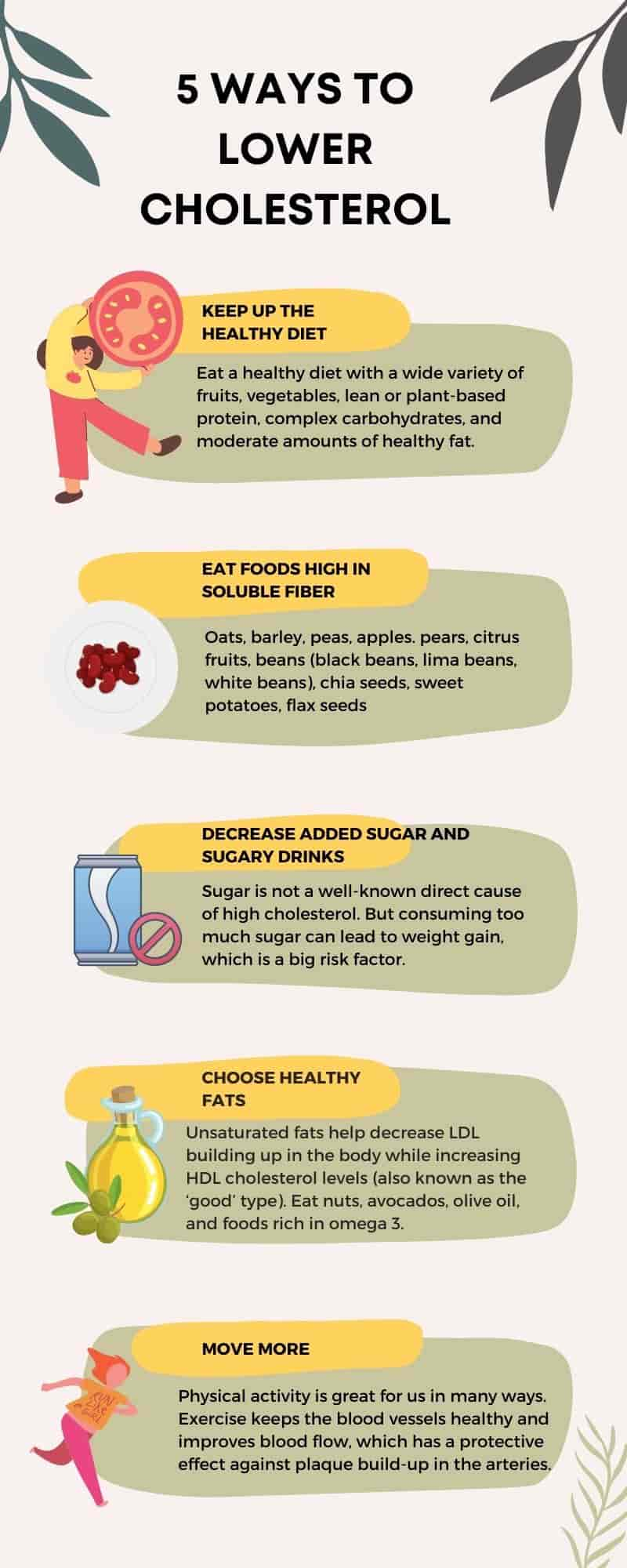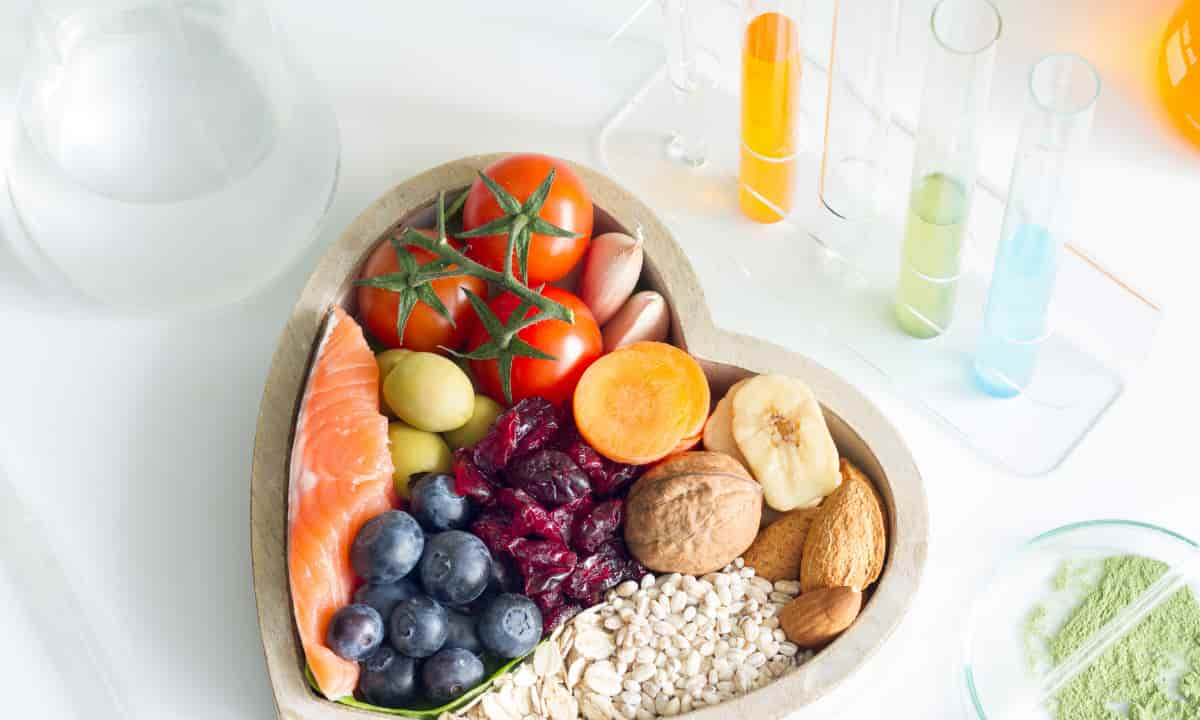Nutrition to Help Decrease Cholesterol in Menopause
Did you know that menopause and cholesterol are closely related? This blog post will discuss the connection between them and treatments to help ensure it doesn’t cause health problems later in life.
Table of Contents
ToggleWe will also provide some helpful tips on controlling cholesterol to reduce your risk of developing heart disease.
Menopause and Cholesterol
During menopause, hormones fluctuate dramatically, leading to changes in metabolism and the way cholesterol is processed in the body.
Studies examining its relationship to menopause are ongoing, but it’s already clear that there is a connection between the two.
Menopause Increases LDL Cholesterol
LDL cholesterol, also known as the ‘bad’ type, can build up in the arteries and cause blockages.
During menopause, estrogen levels drop sharply, which can cause an increase LDL. This is because estrogen helps remove it from the body, so levels may increase when hormone levels decrease. This buildup creates a significant risk for heart disease.
A review of 66 studies that altogether included 114,465 women found that post-menopausal women had higher triglyceride levels, higher LDL, and higher total cholesterol than premenopausal women.
What Else Can Affect Cholesterol Levels?
Besides menopause, there are several other factors that can increase the amount of LDL in your body, such as:
- Genetics (like familial hypercholesterolemia)
- Unhealthy eating
- Type II diabetes
- Obesity
- Consuming alcohol
- Low physical activity
- Smoking
Nutrition Can Help Lower Cholesterol in Menopause
There are several actions you can take to help improve cholesterol levels and reduce any risk of heart disease.

Eat a Well-Balanced Diet
For overall good health, but particularly to control cholesterol during menopause, you should eat a healthy diet with a wide variety of fruits, vegetables, lean or plant-based protein, complex carbohydrates, and moderate amounts of healthy fat.
Eat Foods High in Soluble Fiber
Soluble fiber decreases cholesterol levels by binding with it and then excreting it from the body. Foods high in soluble fiber include:
- Oats
- Barley
- Peas
- Apples
- Pears
- Citrus fruits
- Beans (black beans, lima beans, white beans)
- Chia seeds
- Sweet potatoes
- Flax seeds
Choose Healthy Fats
Unsaturated fats help decrease LDL building up in the body while increasing HDL cholesterol levels (also known as the ‘good’ type).
However, even these good fats need to be consumed in moderation.
Some examples of healthy unsaturated fats include:
- Nuts (cashews, peanuts, almonds)
- Avocados
- Olive oil
- Omega 3 (found in salmon, mackerel, flaxseed, flaxseed oil, chia seeds, walnuts)
Limit Saturated Fats
Saturated fats can increase LDL levels. They are found in animal products, such as:
- Meats, including beef, pork, veal, lamb
- Processed meats, such as salami, ham, pepperoni, sausages
- High-fat dairy products such as ice cream, whole milk, certain cheeses like cheddar cheese, parmesan
- Tropical oils like coconut oil, palm oil
- Butter, lard
- Baked goods like croissants, pastries, desserts
Decrease Added Sugar and Sugary Drinks
Sugar is not a well-known direct cause of high cholesterol. But consuming too much sugar can lead to weight gain, which is a big risk factor.
What’s more, the way that sugary drinks are broken down and utilized in our bodies creates fatty acids. Also, sugary drinks don’t alert your brain to the fact that you have energy; therefore, it’s easy to over-consume calories and sugar without realizing it. Think about how easy it is to drink a 20-ounce bottle of soda.
To help lower cholesterol, aim to limit sugary foods and drinks, including:
- Cakes
- Candies
- Cookies
- Ice cream
- Pies
- Fruit juices with added sugars
- Regular soda
This may not be easy, especially with the increased sugar cravings that menopause brings. But don’t worry; here are our 11 Tips to Stop Menopause Sugar Cravings.
Limit Alcohol
Alcohol and cholesterol have a complicated relationship.
Moderate consumption of alcohol can result in higher amounts of HDL in the body. But, heavy drinkers are at an increased risk for high LDL and other chronic diseases, such as liver disease and cancer.
If you do drink alcohol, the American Heart Association recommends that women have no more than one drink a day and men have no more than two drinks a day.
A standard drink measures:
- 12 ounces of regular beer (about 150 calories)
- Five ounces of wine (about 100 calories)
- One and a half ounces of 80-proof liquor (about 100 calories)
Lose Weight
Obesity can increase LDL cholesterol and decrease the beneficial HDL levels. Studies have shown that obesity affects the way cholesterol is created and absorbed. This results in an unhealthy buildup in the liver.
Weight loss can be an intimidating journey during menopause and perimenopause, particularly because the changes in your hormones during this time can make it more challenging. Weight loss after 40 is possible, but it takes a different approach.
Exercise

Physical activity is great for us in many ways. Exercise keeps the blood vessels healthy and improves blood flow, which has a protective effect against plaque build-up in the arteries.
Exercise can also help raise HDL cholesterol.
Dietary Approaches
It can be daunting to decide which foods to include and exclude from your diet. If you struggle with planning your healthy diet you may prefer to follow specific diet plans.
Mediterranean Diet
The Mediterranean diet is by far the one that experts recommend the most.
This eating pattern focuses on an abundance of healthy food and on enjoying the meals.
It’s a diet that is rich in seeds, nuts, olive oil, vegetables, fruits, whole grains, lean meats, and fish.
The components of the Mediterranean diet can decrease LDL and increase HDL cholesterol. It’s also widely known that this diet has a protective effect on heart health.
Anti-Inflammatory Diet
Inflammation is linked to high cholesterol and heart disease. Therefore, an anti-inflammatory diet may help reduce the risk of heart disease.
The anti-inflammatory diet focuses on eating whole, unprocessed foods. This plan includes fruits and vegetables, whole grains, fish, nuts and seeds, beans and legumes, and healthy fats.
Read more about the anti-inflammatory diet and get a meal plan here.
The Bottom Line
The decreased estrogen levels that women face during and after menopause can have a negative impact on their risk of high cholesterol, which increases the likelihood they will contract heart disease.
But high cholesterol and heart disease are not guaranteed. There are many ways to help you regulate your cholesterol levels, like a healthier lifestyle generally and dietary changes.
If the amount of LDL in your system is greater than it should be, talk to your healthcare provider to determine if medication is necessary to help control it.
“Menopause and Cholesterol: What You Need to Know” was written by Su-Nui Escobar, DCN, RDN, FAND, and Registered Dietitian Irene Mejia

Dr. Su-Nui Escobar, a Registered Dietitian/Nutritionist in Miami, FL, is dedicated to empowering women in perimenopause and menopause to live healthier, more satisfying lives.
With a doctorate in clinical nutrition from the University of North Florida, she has expertise in menopause and weight loss, including the unique challenges faced by those on weight loss medications.
Su-Nui’s passion for her field is evident in her previous role as the Academy of Nutrition and Dietetics spokesperson.


